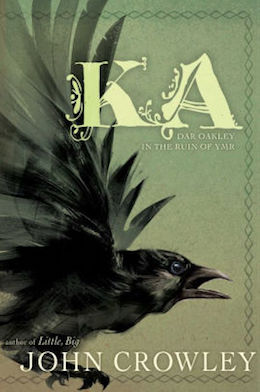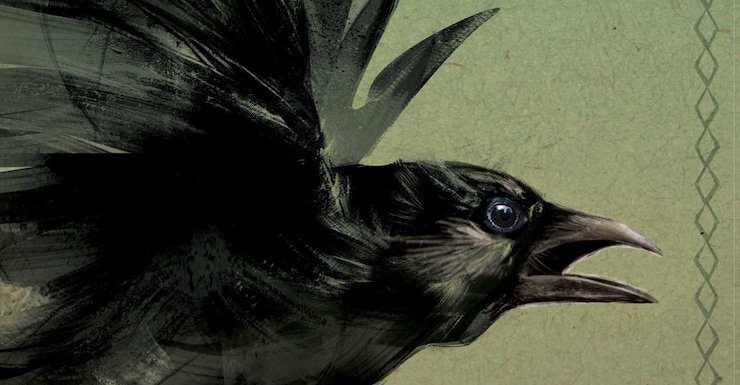John Crowley’s Little, Big has a name as a classic. Crowley himself received the World Fantasy Award for Lifetime Achievement in 2006. Despite this, I came to Ka: Dar Oakley in the Ruin of Ymr never having read a word of Crowley’s prose before in my life. It’s simultaneously freeing and intimidating to come to the latest work of an author with such a reputation completely fresh: freeing, because I can come to the text without any pre-formed idea of what it might or could be. And intimidating, because clearly a lot of other people have had a lot of positive feelings about Crowley’s work, and if I don’t like it, I must suffer the persistent suspicion that there’s something I’m missing.
Spoiler: there’s something I’m missing.
Ka: Dar Oakley in the Ruin of Ymr is the most baffling novel I can remember reading. (It may not be the most baffling book, but that’s because I worked my way through Pierre Bourdieu’s The Logic of Practice and Outline of a Theory of Practice, the latter of which contains an oxymoron in its very title). At the prose level, it’s beautiful. Thematically, it seems to be a story about stories and, perhaps, also about death: about change and changelessness.
Buy the Book


Ka: Dar Oakley in the Ruin of Ymr
Maybe. I’m not sure. That uncertainty is not a productive tension, the conviction that if I look at things from the right angle, through the right lens, that if I read it again in a different frame of mind or a different slant of light, I’ll see more than has been revealed: that the skin will sheer back to show me vein and muscle. That it’ll give me a glimpse of a vivid heart. That the conversation—the arguments—it’s having just beyond the threshold of my perception will become visible, palpable. That it’ll make me feel something other than: huh?
The novel is framed as a story told by a man—an old man—in a world just a little more apocalyptic than our present. He claims to be telling Dar Oakley’s story as Dar Oakley told it to him. He also wonders if he is deluding himself that a Crow spoke to him.
Dar Oakley is a Crow. Dar Oakley is the first Crow (the capitals are Crowley’s) to have a name, and the first to engage with the People. He learns to communicate with People, and he learns to think about things that Crows have no words for, and enters partway into the world that exists alongside the everyday world of People, where things become real because People believe them to be so. Dar Oakley travels into this realm with a Person, his friend Fox Cap, and after this—after a theft and a loss—it transpires that for him, death is not permanent. He can die by violence, but even then, he comes back: in his next lives he regains his memories of himself as Dar Oakley, and everything that has gone before.
The story follows Dar Oakley from what looks like the European Bronze Age into the medieval period (where he befriends a monk and goes on a sea journey, learning to travel like a Tern) after which he ends up in the Americas in time to feast on the fruits of genocide. He lives again through a period where there is a bounty for the killing of Crows, and has a human Nemesis. Then he lives through a last period in a modern city, and encounters the narrator. Finally, the narrator recounts his (the narrator’s) attempt to travel into the underworld while still living himself, with Dar Oakley’s aid.
Here we have a leisurely ramble through myth-making and the lives of Crows. (Crowley’s crows are believably corvid.) But across the novel’s sections—and there are several chronologically distinct ones—it was difficult for me to find any sort of unifying idea to bring the project of the book into focus. The hazy meandering is a pleasure in itself for a time, but after a while, the accumulated But what? Why? …Is this trying to say something in particular? grows heavy.
In the end, I can’t find enough purchase here to form a strong conclusion about what Ka: Dar Oakley in the Ruin of Ymr is doing, or to whom it will appeal. It seems to me to veer between the facile and the deep, and its persist refusal to commit to having an argument, or at least making its thematic argument visible, making its structure less paradoxically open-ended and circular at once, is a trait that annoys me to bits.
Though perhaps the mystification is itself the point.
If you like this sort of thing, then this is the sort of thing you will like. As for me… well. I’m definitely missing something here.
Ka: Dark Oakley in the Ruin of Ymr is available from Saga Press.
Read an excerpt from the novel.
Liz Bourke is a cranky queer person who reads books. She holds a Ph.D in Classics from Trinity College, Dublin. Her first book, Sleeping With Monsters, a collection of reviews and criticism, is out now from Aqueduct Press. Find her at her blog, where she’s been known to talk about even more books thanks to her Patreon supporters. Or find her at her Twitter. She supports the work of the Irish Refugee Council and the Abortion Rights Campaign.











I read little, big and this sounds the same. Well written but the plot was obtuse to the point of distraction.
you are not alone!
I must admit to having had the same issues when reading a John Crowley book many years ago. I’ve thought of trying him again, hoping that the passage of some decades might provide a different perspective, but it seems as if my experience is not a singular one.
I’m a big fan of fantasy so somebody recommended Little, Big to me–but I bounced off it hard. All I can remember about it is some boy wandering down a pretty country lane while elsewhere people scheme to get him to marry some girl, and I sort of recall that it doesn’t go well.
@1, To me, Crowley is less about plot and more about theme, using lovely prose. His characters and worlds exist to explore ideas and themes, and while there’s generally a thin plot of sorts it’s not really that important. Though the plot of Little Big was a metaphor for its main theme.
I’ve not read this book, but it sounds like more of the same, except in small doses strung together by a frame. Which makes me think of crow treasures hanging in a dream catcher.
There is nothing so tedious as somebody telling you why you should like a writer you don’t much like — so I apologize! But John Crowley is such a great writer, and I’d suggest such an important writer, that I’ll transgress … I’ve just finished Ka, and of course it is about death. (And about stories.) One death it is about, I think, is the death of Ymr — that is, of the human world. And it is throughout intensely elegiac in meditating on this.
That elegiac tone is common for Crowley, and so I’ll recommend one of his greatest works, and also a perhaps more readily accessible work: his third novel, Engine Summer. That’s much shorter than Little, Big, or Ka, or certainly Aegypt, so perhaps better to try anyway. It’s one of my very favorite SF novels of all time. A post-apocalyptic novel, and a bildungsroman, sweet, mysterious, heartbreaking, and, yes, elegiac. And so so very much about stories, and about memory. With one of the greatest of last lines: “Ever after. I promise. Now close your eyes.”
(There are great shorter stories too — the novellas “Great Work of Time” and the non-SF “The Girlhood of Shakespeare’s Heroines” are two I’d particularly recommend.)
(One more point about Crowley is the prose — even if the plot is less urgently formed that in some novels, there is always the prose: simple and wise and beautiful.)